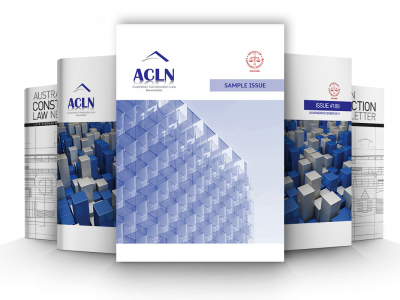The Australian Construction Law Newsletter (ACLN) includes articles, case notes, book reviews and up-to-date analyses on important developments in construction law.
The ACLN engages in all matters relating to building and construction law, with emphasis on construction claims, disputes and contracts, and international arbitration.
We source the most relevant and interesting material affecting the construction industry that is not necessarily available to all members of the building and construction community.
Australian Construction Law Newsletter (ACLN), building, journals, construction community, law, lawyers, solicitors, law firm. australia, sydney, melbourne, brisbane, canberra, adelaide, perth, darwin
5
home,page-template,page-template-full_width,page-template-full_width-php,page,page-id-5,theme-bridge,bridge-core-3.3.3,woocommerce-no-js,qode-optimizer-1.0.4,qode-page-transition-enabled,ajax_fade,page_not_loaded,,qode-title-hidden,side_area_uncovered_from_content,columns-4,qode-theme-ver-30.8.6,qode-theme-bridge,disabled_footer_top,qode_header_in_grid,wpb-js-composer js-comp-ver-8.2,vc_responsive
Australia’s leading independent construction law publication
The Australian Construction Law Newsletter (ACLN) includes articles, case notes, book reviews and up-to-date analyses on important developments in construction law.
The ACLN engages in all matters relating to building and construction law, with emphasis on construction claims, disputes and contracts, and international arbitration.
We source the most relevant and interesting material affecting the construction industry that is not necessarily available to all members of the building and construction community.
READ MORE ABOUT ACLN
DOWNLOAD A SAMPLE ISSUE
The ACLN is published six times annually – the subscription period being from January to December.
There are no pro-rata subscription options.
We understand that our subscribers have different needs, and we are pleased to offer a range of subscription options.
These range from individual to unlimited subscriptions.
The appropriate number of subscriptions depends on the number of locations your organisation has which would like access to the ACLN.
Please contact us if you are unsure.
Loading...
Posted to one location.
$555.00 (incl. GST)
Posted to one location.
$595.00 (incl. GST)
Suitable for one location.
$485.00 (incl. GST)
Suitable for one location.
$525.00 (incl. GST)
Suitable for two locations.
$910.00 (incl. GST)
Suitable for three locations.
$1,275.00 (incl. GST)
Suitable for four locations.
$1,575.00 (incl. GST)
Suitable for unlimited locations.
$1,820.00 (incl. GST)
Would you like to submit an article for publication?


 1 x e-subscription
1 x e-subscription









